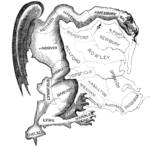 You hear a lot today about how “broken” Washington is. It’s true, Congress has the lowest approval ratings (for both parties) in current memory, and the last few sessions (with Republicans holding both houses) have been focused on doing little more than preventing any initiatives proposed by Obama’s administration from having a prayer. And I’ve commented before that I think that the successes that both Trump and Sanders have enjoyed during the primaries represents a “no-confidence” vote on the part of a significant number from each party for the party leadership (or perhaps against “business as usual” in Washington). Pretty much everyone agrees that our elected leaders are just not doing their job. “Why can’t anyone get anything done?” is what I hear a lot. The obvious implication being that somehow, once the legislators gets to Washington and the legislative session begins, they all forget what they were elected to do. That Washington is broken is “their fault.” But I think that’s exactly wrong. I think they are doing precisely what they were elected to do; the problem lies not in Washington, but in each home district. In other words, we have exactly the government we want.
You hear a lot today about how “broken” Washington is. It’s true, Congress has the lowest approval ratings (for both parties) in current memory, and the last few sessions (with Republicans holding both houses) have been focused on doing little more than preventing any initiatives proposed by Obama’s administration from having a prayer. And I’ve commented before that I think that the successes that both Trump and Sanders have enjoyed during the primaries represents a “no-confidence” vote on the part of a significant number from each party for the party leadership (or perhaps against “business as usual” in Washington). Pretty much everyone agrees that our elected leaders are just not doing their job. “Why can’t anyone get anything done?” is what I hear a lot. The obvious implication being that somehow, once the legislators gets to Washington and the legislative session begins, they all forget what they were elected to do. That Washington is broken is “their fault.” But I think that’s exactly wrong. I think they are doing precisely what they were elected to do; the problem lies not in Washington, but in each home district. In other words, we have exactly the government we want.
Oh, not consciously, of course. But think about it. I live in California, which although a reliably “blue” state, my county (Orange) is about as Republican as it can get. Let’s say that the Representative from my area, a Republican named Dana Rohrabacher, suddenly woke up tomorrow and decided that “By golly, I’m done trying to get the Affordable Health Care Act repealed; the American people deserve to have access to insurance regardless of their economic situation! I’m going to go talk to my friends across the aisle and see if we can’t work out some way to make this program the best it can be for the American people! Oh sure, it’s got some problems, but I’m willing to compromise to make things work out!” My prediction is that he wouldn’t last to the next election; his constituency would hold a recall vote so fast his head would spin and he’d be out of a job in a few weeks. Plug in your favorite Democrat in the opposite situation and I suggest you’d get the same thing.
So what’s going on?
Back to our friend Rohrabacher. In his home district any Democrat running against him has virtually zero chance of getting elected. That’s interesting, because Orange County is not homogenous; in fact it is becoming heavily Latino. Santa Ana (the county seat) has more Spanish-speaking people (as a first language) than English, or so I’ve heard. And while the Hispanic population is heavier in Santa Ana, it is scattered around the county quite a bit as well. True, there are some very heavily “white” cities like Irvine and others, but it doesn’t account for the virtual death grip Rohrabacher has on his particular district. What does however is called gerrymandering. This is named after Elbridge Gerry, a governor in Massachusetts in the early 1800s who re-drew the boundaries of his district to include areas where his supporters dominated and excluded areas where he lacked support. This effectively ensured his re-election as long as he continued to run for office. The name came from the conflation of his name and the fact that his new district looked a little like a salamander (right). The practice was copied by other politicians until it became the norm. Since members of the US Senate are elected in a statewide election (and state lines are not redrawn very easily), gerrymandering doesn’t apply in Senatorial elections but is common in House elections. As the demographics shifts, you’ll see lots of reshuffling and redrawing of districts (by both Democrats and Republicans).
a governor in Massachusetts in the early 1800s who re-drew the boundaries of his district to include areas where his supporters dominated and excluded areas where he lacked support. This effectively ensured his re-election as long as he continued to run for office. The name came from the conflation of his name and the fact that his new district looked a little like a salamander (right). The practice was copied by other politicians until it became the norm. Since members of the US Senate are elected in a statewide election (and state lines are not redrawn very easily), gerrymandering doesn’t apply in Senatorial elections but is common in House elections. As the demographics shifts, you’ll see lots of reshuffling and redrawing of districts (by both Democrats and Republicans).
If you’re in a district more evenly split, the elected official needs to balance often-competing interests, and is more likely to work with his or her counterparts in the other party to get things done. But in a gerrymandered district, there is a strong disincentive to go against the party that elected you.
Back to our initial point: unless (and until) we as a voting populace get rid of gerrymandered districts we’re going to have Washington stacked with ideologues who have no motivation nor even inclination to go against their party. The hard part is to force redistricting even (especially?) where our own positions dominate.
Until we do that we will continue to have only ourselves to blame for a “broken” Washington.
About BigBill
Stats: Married male boomer.
Hobbies: Hiking, woodworking, reading, philosophy, good conversation.

Is our government broken?
Oh, not consciously, of course. But think about it. I live in California, which although a reliably “blue” state, my county (Orange) is about as Republican as it can get. Let’s say that the Representative from my area, a Republican named Dana Rohrabacher, suddenly woke up tomorrow and decided that “By golly, I’m done trying to get the Affordable Health Care Act repealed; the American people deserve to have access to insurance regardless of their economic situation! I’m going to go talk to my friends across the aisle and see if we can’t work out some way to make this program the best it can be for the American people! Oh sure, it’s got some problems, but I’m willing to compromise to make things work out!” My prediction is that he wouldn’t last to the next election; his constituency would hold a recall vote so fast his head would spin and he’d be out of a job in a few weeks. Plug in your favorite Democrat in the opposite situation and I suggest you’d get the same thing.
So what’s going on?
Back to our friend Rohrabacher. In his home district any Democrat running against him has virtually zero chance of getting elected. That’s interesting, because Orange County is not homogenous; in fact it is becoming heavily Latino. Santa Ana (the county seat) has more Spanish-speaking people (as a first language) than English, or so I’ve heard. And while the Hispanic population is heavier in Santa Ana, it is scattered around the county quite a bit as well. True, there are some very heavily “white” cities like Irvine and others, but it doesn’t account for the virtual death grip Rohrabacher has on his particular district. What does however is called gerrymandering. This is named after Elbridge Gerry, a governor in Massachusetts in the early 1800s who re-drew the boundaries of his district to include areas where his supporters dominated and excluded areas where he lacked support. This effectively ensured his re-election as long as he continued to run for office. The name came from the conflation of his name and the fact that his new district looked a little like a salamander (right). The practice was copied by other politicians until it became the norm. Since members of the US Senate are elected in a statewide election (and state lines are not redrawn very easily), gerrymandering doesn’t apply in Senatorial elections but is common in House elections. As the demographics shifts, you’ll see lots of reshuffling and redrawing of districts (by both Democrats and Republicans).
a governor in Massachusetts in the early 1800s who re-drew the boundaries of his district to include areas where his supporters dominated and excluded areas where he lacked support. This effectively ensured his re-election as long as he continued to run for office. The name came from the conflation of his name and the fact that his new district looked a little like a salamander (right). The practice was copied by other politicians until it became the norm. Since members of the US Senate are elected in a statewide election (and state lines are not redrawn very easily), gerrymandering doesn’t apply in Senatorial elections but is common in House elections. As the demographics shifts, you’ll see lots of reshuffling and redrawing of districts (by both Democrats and Republicans).
If you’re in a district more evenly split, the elected official needs to balance often-competing interests, and is more likely to work with his or her counterparts in the other party to get things done. But in a gerrymandered district, there is a strong disincentive to go against the party that elected you.
Back to our initial point: unless (and until) we as a voting populace get rid of gerrymandered districts we’re going to have Washington stacked with ideologues who have no motivation nor even inclination to go against their party. The hard part is to force redistricting even (especially?) where our own positions dominate.
Until we do that we will continue to have only ourselves to blame for a “broken” Washington.
About BigBill
Stats: Married male boomer. Hobbies: Hiking, woodworking, reading, philosophy, good conversation.